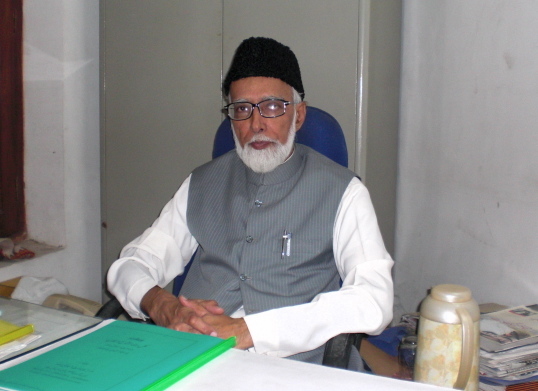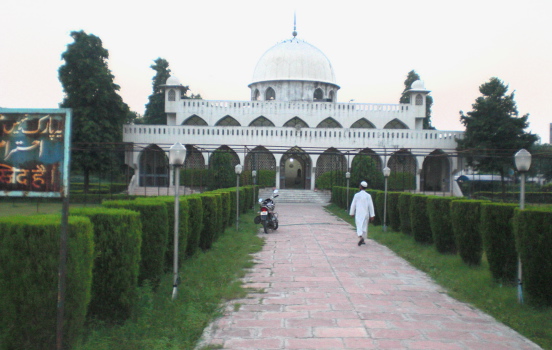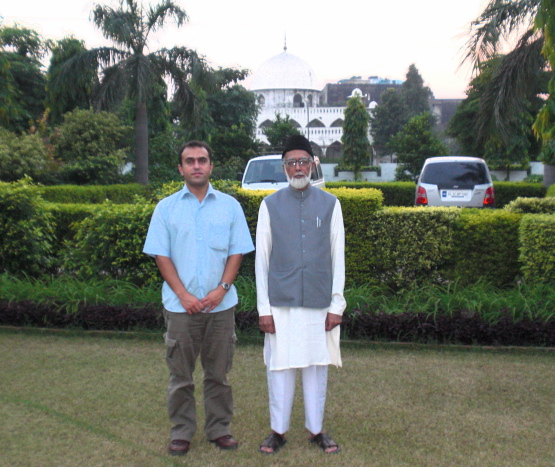
Ejaz Ahmed Aslam was born in Bangalore (Southern India) in 1943. He obtained an MA in English Literature from Bihar University. Subsequently he lectured in English Literature at the C. Abdel-Hakim College in Melvisharam, Tamil Nadu state.
Aslam joined the Jammat-e-Islami Hind (JIH) in 1957 at the age of 14. He was president of the Tamil Nadu chapter of the JIH from 1977 to 1990. In 1990 he became the national secretary of the JIH responsible for Public Relations, a position he maintains to this date. Aslam is the editor of the weekly “Radiance”, an Islamic-oriented journal of opinion.
This interview was conducted on Sunday 26 September at the national headquarters of the JIH in the Jamia Nagar district of New Delhi.
Mahan Abedin – What is the role of the Jammat-e-Islami Hind (JIH) in Indian politics?
Ejaz Ahmed Aslam – Jammat-e-Islami Hind stands for Islam and works on behalf of Islam. Political and economic activities are parts of Islam. In short, the JIH is an Islamic organization that is trying to promote, propagate and strengthen Islam. Our primary role in India is to protect and strengthen the Muslim community in addition to reaching out to non-Muslims. Politics is important since politicians shape the future of a country. In the political sphere hitherto the Jammat-e-Islami has given opinions about political parties and supported certain political figures with a reputable ethical background. In the future we may expand our role.
Mahan Abedin – Your critics argue that since the early 1990s with the advent of Abdul Haq Ansari’s leadership the organisation no longer adheres to the core JI ideology. Is this a fair criticism?
Ejaz Ahmed Aslam – We are talking about a process of evolution. Organisations and ideologies evolve. We don’t agree that we have relinquished our core ideology. Islam remains our core ideology and we are still working earnestly on behalf of Islamic causes.
Mahan Abedin – You deny there has been a watering down of certain core beliefs?
Ejaz Ahmed Aslam – For example?
Mahan Abedin – How about the programme to create an Islamic state. Are you still committed to this programme?
Ejaz Ahmed Aslam – In 1941 when the Jammat-e-Islami Hind was formed in undivided India, the organisation used the terminology “Hokumat-e-Ilahiya” (Divine Government) in its constitution. This created scope for misunderstanding, and so in 1956 the Indian division of the Jammat-e-Islami changed the terminology to the “Establishment of God’s Religion”. I don’t know if the Pakistani Jamaat has retained the original terminology in its constitution but as far as we are concerned the terminology has been changed to remove any misunderstanding while still reflecting the Quranic ethos of our programme. Note that Islam is a comprehensive way of life and it begins with the belief in and submission to God, before proceeding to teach us how to worship God. Then it prescribes for its followers a social and economic system and finally it provides the concept of a state. The Islamic state comes into existence only after all the aforementioned criteria have been achieved. Therefore, giving undue importance to state and politics would not be correct in the context of the JIH.
Mahan Abedin – Has your sometimes difficult relationship with the Indian state informed your actions and ideological transformations over the decades? I refer specifically to the proscription of the JIH between 1975-1977 and then again in 1992 in the wake of the so-called Ayodhya (Babri Mosque) riots.
Ejaz Ahmed Aslam – I am going to tackle both proscriptions separetly. In 1975 the then Prime Minister of India Indira Ghandi was struggling for political survival. She decided to ban 26 parties and she felt she had to ban at least one Muslim party so as to appear even-handed in her approach. In actual fact there was no need to ban the JIH since by all accounts the organisation was a law-abiding and peaceful party. In 1992 the Babri Mosque was demolished at the behest of extremist Hindu groups such as the BJP (Bharatiya Janata Party-Indian Peoples’ Party) and the RSS (Rashtriya Swayamsevak Sangh-National Volunteer Organisation) and the JI had no role whatsoever in the violence. The Indian state felt it needed to maintain a balance in its response to the violence, therefore they decided to mete out similar punishment to both aggressor and the victim alike. That is why the JIH was banned.
Mahan Abedin – Do you still believe in the concept of an Islamic state? If so, what would be the precise role of the Shariah in the Islamic state’s legal framework?
Ejaz Ahmed Aslam – In the Indian context, in a country with 1.2 billion people where Muslims constitute only 14% of the population, there are many misunderstandings about Islam. We sincerely believe that Islam should be introduced to the non-Muslims but only as part of a gradual process. We don’t insist on leading the government.
Mahan Abedin – Correct me if I am wrong but it appears that your chief role in this country is to protect the rights of an embattled Muslim minority.
Ejaz Ahmed Aslam – No, not only that. We are different in this respect to the other Muslim organisations, such as the Muslim League and other smaller groups. Unfortunately the Muslims in India are politically fragmented. They owe allegiance to numerous parties, at both national and local levels. There is a lot of work to be done in India in terms of introducing Islam to as broad an audience as possible. Protecting the rights of Muslims, other minorities and the weaker sections of society constitutes one aspect of our activities. Our basic and main work is introducing Islam and developing the individual and collective life of the people in the light of Islamic teachings. Gradually these activities will lead to the desired changes in society.
Mahan Abedin – Why did the JIH decide to compete in the electoral process of a secular democracy despite the fact that the founder of the organisation, the late Maulana Syed Abul A’ala Maududi, was opposed to democracy?
Ejaz Ahmed Aslam – This is an erroneous assumption. Maulana Maududi was not against democracy. Maududi was a firm believer in Islamic democracy. In fact he introduced the concept of “Theo-Democracy”, arguing that God and divine values should have a central role in the affairs of the state. According to Maududi’s model the ideal Islamic state is characterised by a multi-party political system where the rights of all minorities are recognised and respected. Maulana Maududi was always at the forefront of strengthening democracy in Pakistan.
Mahan Abedin – Accepting the demographic realities of contemporary India (where Muslims are a relatively small minority), nonetheless do you still consider yourself as a pan-Islamic party? For instance, do you subscribe to the ideal of uniting the Muslim Ummah under a common leadership?
Ejaz Ahmed Aslam – We don’t have any organisational links to Islamic groups anywhere in the world. We don’t even have any organisational links to other Jammat-e-Islami organisations in the Indian subcontinent, namely the JI in Pakistan, Bangladesh and Sri Lanka. These entities are independent organizations working in the context of nation-states.
Mahan Abedin – My question relates to the ideological as opposed to organisational level. Do you believe in a unified Ummah?
Ejaz Ahmed Aslam – The Muslim Ummah is a reality. There are 57 independent countries that are part of this global Ummah. The Islamic Ummah is also embodied by Muslim minorities in Western countries as well as other parts of the world. Muslims who comprise 1.6 billion or around 23 % of the world’s population constitute one Ummah, with one view of life and one objective of following and spreading Islam with a view to establishing justice, human rights and prosperity in this world and ensuring eternal success in the hereafter.
Mahan Abedin – Let me put the question another way. Do you feel you belong to the modern movement of Islamic revivalism? I am referring to the movement that began well over a hundred years ago and which in recent decades appears to be strengthening, especially in the light of the victory of the Islamic Revolution in Iran and the emergence of strong and popular-based Islamic political parties in the Middle East, North Africa and South-East Asia.
Ejaz Ahmed Aslam – We have sympathy with all the Islamic movements and organisations that are operating across the world under unique political, socio-economic and cultural conditions. We want Muslims everywhere to observe Islamic practices and standards both in their private life as well as their public one.
Mahan Abedin – There are rumours that the JIH intends to float its own political party in the next elections season. Is this true? If so, what impact is it likely to have on your relations with other Muslim organisations in India?
Ejaz Ahmed Aslam – From the beginning the JIH has had its own political views and positions. For instance, we have been calling for responsible government, respect for basic human rights and the protection of minorities. We have come to the conclusion that instead of floating a separate political party, it is better to lend a helping hand to certain people who share our views and concerns.
Mahan Abedin – Please be clearer in your answer. Are you going to form a separate political organisation to promote your agenda?
Ejaz Ahmed Aslam – The JIH considered all the relevant dimensions related to the creation of a separate political party but it reached the conclusion that it is not willing to relinquish the core work that it has carried out every day without fail here in India for the past 70 years.
Mahan Abedin – In Egypt the Muslim Brotherhood – or at least sections of it – is conducting an internal debate on the utility or otherwise of creating a separate political wing to engage in purely political work. Some within the Brotherhood argue that this division of labour carries the advantage of freeing the movement to engage in what they believe is its core work, namely social welfare and Islamic Daawa (missionary work). Is the JIH engaged in a similar internal debate?
Ejaz Ahmed Aslam – We have come into contact with certain people who share our values and concerns and with the help of these people we may undertake certain political initiatives in the future. Whenever the JIH decides to undertake a substantial body of work it only does so after a lengthy period of debate, analysis and consultation. The JIH always has the long-term perspective in mind; we are not animated by specific election seasons. Moreover, we fully understand the ground realities in India. Muslims are spread thinly on the ground and we must adapt our strategy accordingly. Besides, in order to achieve the objectives of a peaceful, democratic and prosperous India we require the help of all sections of society, including Hindus, Christians, Dalits and others.

Mahan Abedin – What is the numerical strength of the JIH?
Ejaz Ahmed Aslam – Our strength should not be measured purely on numerical terms. We have 7,500 members and about 50,000 workers (Karkun) and millions of supporters. The JIH is the only Muslim organisation in India that exists in every state and every corner of this huge country. We publish up to 40 newspapers and magazines in 12 languages.
Mahan Abedin – What you are describing points to substantial and consistent activity. How do you finance these activities?
Ejaz Ahmed Aslam – We are funding it through our own resources. Every member of the Jammat must pay Zakat (Islamic taxes) to the organisation. In addition we receive funds from our sympathisers.
Mahan Abedin – How would you describe your relationship with other Muslim organisations in India?
Ejaz Ahmed Aslam – They are becoming more and more cordial. In 1941 when the JIH was born many Ulama (religious scholars) opposed the organisation because of ignorance. They said we are deviant. The Ulama of Dar-Ul Uloom Deoband took a very hard line against the organisation. But that opposition has subsided.
Mahan Abedin – Would you describe yourself as the biggest Muslim organisation in India?
Ejaz Ahmed Aslam – By the grace of Allah (SWT) yes. We don’t like to make big claims but it is a fact, as evidenced by the depth and breadth of our activities in every corner of India.
Mahan Abedin – How would you describe your relationship to other JI divisions in the Indian subcontinent? Are you even communicating with them?
Ejaz Ahmed Aslam – The JIH is a separate and Independent entity. We are very careful in this respect because we understand the geopolitical realities of this region. Subsequently, we don’t maintain any organisational ties. However, when we come across JI representatives from other countries, we exchange views, insights and experiences.
Mahan Abedin – Is there still a feeling of brotherhood?
Ejaz Ahmed Aslam – There is a feeling of affinity based on the fact that we share the same origins, ideology and literature.
Mahan Abedin – We hear very little about the Jammat-e-Islami in Sri Lanka. How active is this organisation and what is its precise role in Sri Lankan politics?
Ejaz Ahmed Aslam – I have visited Sri Lanka four times in the past 18 years because I am from Tamil Nadu. The Jammat-e-Islami in Sri Lanka has some contacts with the JI chapter in Tamil Nadu. Beyond this I can’t provide more information.
Mahan Abedin – Do you regard the Jammat-e-Islami in Kashmir as too radical?
Ejaz Ahmed Aslam – The formation of the Kashmir branch of the JI was a separate process; a process unrelated to the formation of the JIH. The Jammat-e-Islami in Kashmir is operating under very different conditions and as a result their members and supporters may have been forced into adopting radical stances and perhaps even support for militancy in the past.
Mahan Abedin – You don’t have any links to the JI in Kashmir?
Ejaz Ahmed Aslam – No, we have never had any links to them.
Mahan Abedin – What is the JIH’s stance on Kashmir?
Ejaz Ahmed Aslam – Obviously this issue is the main bone of contention between India and Pakistan. We believe that the resolution of this conflict will lead to a significant improvement in Indo-Pakistan relations.
Mahan Abedin – What is at the root of the current violence? I am referring to the civil disturbances (marked by stone throwing) which erupted in June 2010.
Ejaz Ahmed Aslam – As far as I can see the common people of Kashmir are not satisfied with prevailing local conditions. I went to Kashmir in a private capacity in June and attended a meeting of about 300-400 local people, in the course of which I said stone throwing alone will not solve your problems. They felt offended and took it badly. The person presiding over the meeting said that the people of Kashmir have been forced to adopt such methods (i.e. stone throwing) because they feel they are marginalised and pushed against the wall.
Mahan Abedin – Is the Indian state acting heavy-handedly in Kashmir?
Ejaz Ahmed Aslam – I don’t believe that a democracy like India should treat young people who are throwing stones in such a careless way. They shouldn’t be using live rounds against essentially unarmed youths.
Mahan Abedin – How do you see the future of inter-communal relations in India in the years and decades ahead?
Ejaz Ahmed Aslam – I think that phase of Hindu-Muslim conflict is coming to an end. I believe democracy is getting stronger and extremist groups are becoming more and more marginalised. The BJP in particular is shedding some of its feathers. The ideology of Hindutva (Hindu nationalism) which has created misperceptions and misunderstandings about Islam and Indian Muslims is losing ground, even amongst its core constituency.

Mahan Abedin – There is a growing discourse of India as an emerging global power. Do you believe this is the case? And if so is it a positive development from the Islamic point of view?
Ejaz Ahmed Aslam – Yes it is a very positive development which can ensure progress and prosperity for common Indians. Our biggest resource is our population. We are 1.2 billion people.
Mahan Abedin – But at least 500 million of these people live in abject poverty.
Ejaz Ahmed Aslam – Ok, that may be the case. The point is we have huge potential provided we take greater care of our people. I believe India can become a superpower.
Mahan Abedin – Superpower in what sense?
Ejaz Ahmed Aslam – In a number of senses, for instance in an economic sense.
Mahan Abedin – What about in the military sphere?
Ejaz Ahmed Aslam – We don’t want our country to become a hegemonic power like the United States. We oppose American policies across the world, particularly in this region. For example, we are strongly opposed to the American-led military interventions in Afghanistan and Iraq. America pokes its nose everywhere and usually leaves chaos in its wake. We don’t want our great country to play such a role. We aspire to a peaceful and constructive outreach to the rest of the world.
Mahan Abedin is a research fellow at the New Delhi-based Institute for Defence Studies and Analysis. Previously he has worked with numerous think tanks, including the Washington-based Jamestown Foundation and the London-based Centre for the Study of Terrorism. He has also been active in journalism, having worked for the Beirut-based Daily Star and most recently the Irbil-based AK News Agency where he was chief editor of the Persian and English sections. Born in Iran, but raised and educated in the United Kingdom, Abedin is a frequent traveller to the Islamic Republic where he is a consultant to independent media.